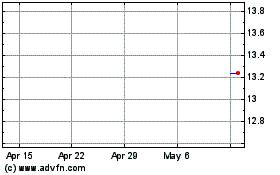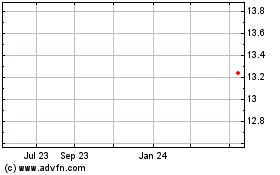Alibaba Smashes Singles' Day Sales Record
11 November 2015 - 9:20PM
Dow Jones News
BEIJING—Alibaba Group Holding Ltd. reported blockbuster sales
for Singles' Day, further highlighting the resilience of the
Chinese consumer despite a flagging economy.
The Chinese e-commerce giant said that by early Wednesday
afternoon, sales on China's Singles' Day had already hit 63.6
billion yuan ($10 billion). Alibaba had already exceeded last
year's 24-hour total of $9.3 billion, in just more than half the
time.
The pace of total transactions recorded—measured by gross
merchandise value, or GMV—indicated the company was on track to
meet some analysts' expectations that the total GMV for the day
would hit or exceed some $13 billion, analysts said.
Sales surged in the early hours of the morning. Alibaba said
that, just in the first 90 minutes, $5 billion of GMV was settled
through its payment affiliate Alipay on the company's Chinese and
international shopping marketplaces.
"It's definitely exceeding what most people were expecting,"
said Daiwa Capital Markets analyst John Choi. "At least on the
current runway, it seems to be very positive."
This year, Alibaba has made globalization a major theme for the
shopping festival and emphasized its ambitions of making this an
international sales event. The company demonstrated this ambition
with a star-studded gala event launching Singles' Day Tuesday
night. The variety show featured a performances by Asian and
Chinese celebrities and appearances by Hollywood stars such as
Daniel Craig.
Many international brands were participating in this year's
sale, including cosmetics giant Esté e Lauder, Spanish clothing
store Zara, British luxury-goods company Burberry and Japanese
apparel chain Uniqlo. In Australia, a brand of baby formula was
flying off shelves because of demand from China.
This year's annual sale, a sales event Alibaba started in 2009,
is being closely watched in part for signs of an impact from
decelerating growth in the world's second-largest economy. In
October, China reported that the economy in the third quarter
sputtered to its slowest pace since the global financial
crisis.
But consumption for now appears to be faring better than the
economy's traditional manufacturing and construction sectors. On
Wednesday, China reported that retail sales rose a
better-than-expected 11% in October, higher than September's 10.9%
growth.
Even amid a slowdown, a day of steep discounts might be the
perfect spending trigger for any pent-up demand, Daiwa's Mr. Choi
said. "It's a day of discounts, so people, regardless of the
economic slowdown, will want to go out and look for bargains," he
said.
Helping boost Alibaba's overall transaction value are a few
weeks of pre-sales promotions, which gave shoppers the ability to
place deposits on some items ahead of the actual sales day and
complete the transactions on Wednesday itself. Such moves raise
questions about the extent to which the promotions are aimed at
making Alibaba's single-day GMV total appear larger. Alibaba has
said the promotions help vendors make sales, not boost numbers,
and allow merchants to gauge demand and prepare for prompt
delivery.
Alibaba's main Chinese rival, e-commerce company JD.com Inc.,
said it recorded more than 10 million orders, a nearly twofold
increase from the same period in 2014. It said that by noon it had
exceeded last year's order volume for the whole day. Unlike
Alibaba, JD.com doesn't release figures for the total value of
merchandise sold on its shopping site on Singles' Day.
Another closely watched metric is the proportion of transactions
that are being made on mobile devices—a measure of how well the
e-commerce companies are adapting to users' shift to smartphones
and tablets. Alibaba said earlier Wednesday that mobile
transactions made up 72% of its total sales, compared with 43% of
transactions last year. Similarly, JD.com said more than 70% of
orders were made on mobile devices.
The sale appears to be exerting an impact on the supply
elsewhere of at least one popular item in China: baby formula.
Baby formula maker Bellamy's Australia Ltd. apologized to its
Australian customers for a shortage of its products. In messages to
consumers on its official Facebook account, the company said demand
for its products in China ahead of Singles Day had curbed stocks on
Australian shelves. "It's a fact that our brand is also very
popular in China, particularly leading up to 'Singles Day'," the
company said.
"As a result some people like to buy our product here from
Australian retailers and on-sell it to China," Bellamy's said. "We
do not condone this activity but we have no control over what
happens to our stock once we have delivered it to our
retailers."
Write to Gillian Wong at gillian.wong@wsj.com
Subscribe to WSJ: http://online.wsj.com?mod=djnwires
(END) Dow Jones Newswires
November 11, 2015 05:05 ET (10:05 GMT)
Copyright (c) 2015 Dow Jones & Company, Inc.
Bellamys Australia (ASX:BAL)
Historical Stock Chart
From Mar 2024 to Apr 2024

Bellamys Australia (ASX:BAL)
Historical Stock Chart
From Apr 2023 to Apr 2024
